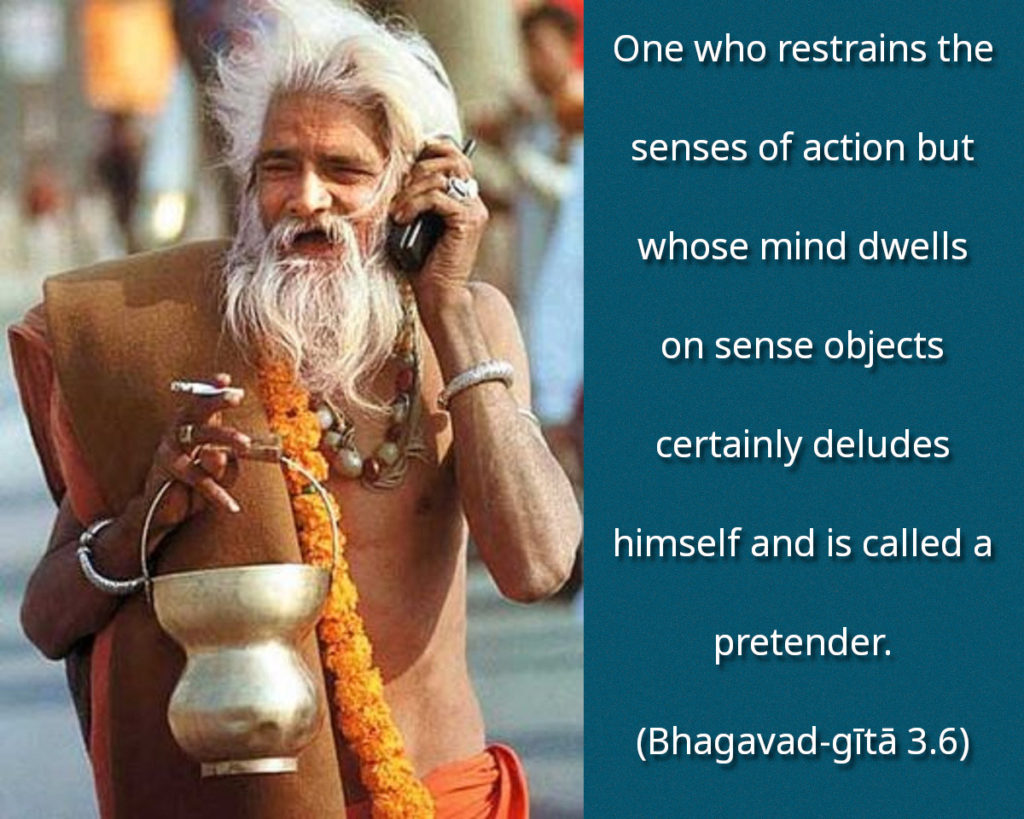कर्मेन्द्रियाणि संयम्य य आस्ते मनसा स्मरन् |
इन्द्रियार्थान्विमूढात्मा मिथ्याचार: स उच्यते || 6||
karmendriyāṇi sanyamya ya āste manasā smaran
indriyārthān vimūḍhātmā mithyāchāraḥ sa uchyate
karma-indriyāṇi—the organs of action; sanyamya—restrain; yaḥ—who; āste—remain; manasā—in the mind; smaran—to remember; indriya-arthān—sense objects; vimūḍha-ātmā—the deluded; mithyā-āchāraḥ—hypocrite; saḥ—they; uchyate—are called
Translation:
The man of deluded understanding who restraining the organs of the action sits contemplating the sense objects with the mind is called a hypocrite.
Commentary:
This is the Lord’s warning to those aspirants who renounce action before attaining complete self-mastery.
Restraining: This is not the true self-restraint of the real seeker. Some pretenders to spirituality appear outwardly pure by keeping back the instruments of action from their natural functions. Such external repression does not lead man to higher planes of spiritual life. Hypocrites appear like sanyasis in their outward life while their mind and heart are defiled by low motives and sensual desires. Such pretenders are found in large numbers everywhere. They have brought disrepute to religion.
The sincere seeker is prompted by the noble aim of realising the truth of religion. Of course in the early stages, of Sadhana, while the external organs are kept in check, the mind wanders about enjoying sense-pleasures in recollections and imaginations. But his aim is to wash the mind of all its impurities both by internal and external restraint. The pretender has no such aim. His object is merely to use religion as a means of livelihood and social prestige. There is a world of difference between the real sadhu and the hypocrite.
Let not the seeker fall into the delusion that the battle with the evil forces is over simply by restraining the organs of action. He should restrain the mind. It is the nature of the mind to wander at random through the objective world, feeding on sensual delights. This has become a mental habit on account of former indulgence in sense-pleasures. Slowly the habit should be changed. Perseverance is necessary. Nothing can be done in a day. Repeated effort over a long period will surely change the mental attitude.
When a seeker undertakes a spiritual practice, he should clearly understand the method and purpose of the sadhana. Otherwise, he moves in the wrong direction. He should learn the principles and practice from experienced teachers. It is not enough to know that sense-organs should be restrained. He should understand its implications. Of what use is it to restrain, the sense-organs when the mind is thinking and enjoying all the forbidden pleasures of the body? The Lord emphatically declares that the purpose of restraining the senses is to purify the mind. Sense-control is not an end in itself. It is the means to an end, the end being the purity of mind.
Of deluded understanding: The wrong practice of the hypocrite is an act of self-delusion. The sense organs and the organs of action have no power to know or experience the objects of the world. It is only when the mind is attached to the senses and the body that sensuous experience is derived. So sense-control should go hand in hand with mind control. Rather mind-control comes first and sense-control in effect takes place as a natural sequence. When the mind is kept under control, there is no harm even if the body and the senses move about in the world to obtain the bare necessities of life. The next verse clarifies the position.
Sri Ramakrishna Says —
An unknown Bengali, dressed in the ochre cloth of a monk, entered the room and sat on the floor. The Master’s mind was coming down to the ordinary plane of consciousness. Presently he began to talk, though the spell of samadhi still lingered.
MASTER (at the sight of the ochre cloth): “Why this gerrua? Should one put on such a thing for a mere fancy? A man once said, ‘I have exchanged the Chandi for a drum.’ At first he used to sing the holy songs of the Chandi; now he beats the drum. (All laugh.)
“There are three or four varieties of renunciation. Afflicted with miseries at home, one may put on the ochre cloth of a monk; but that renunciation doesn’t last long. Again, a man out of work puts on an ochre wearing-cloth and goes off to Benares. After three months he writes home: ‘I have a job here. I shall come home in a few days. Don’t worry about me.’ Again, a man may have everything he wants. He lacks nothing, yet he. does not enjoy his possessions. He weeps for God alone. That is real renunciation.
“No lie of any sort is good. A false garb, even though a holy one, is not good. If the outer garb does not correspond to the inner thought, it gradually brings ruin. Littering false words or doing false deeds, one gradually loses all fear. Far better is the white cloth of a householder. Attachment to worldliness, occasional lapses from the ideal, and an outer garb of gerrua — how dreadful! (Source: Gospel of Sri Ramakrishna)
Question: What is mithyachara?
Answer: Restraining the organ of action, and allowing the mind to wander about in the material world is mithyachara.
